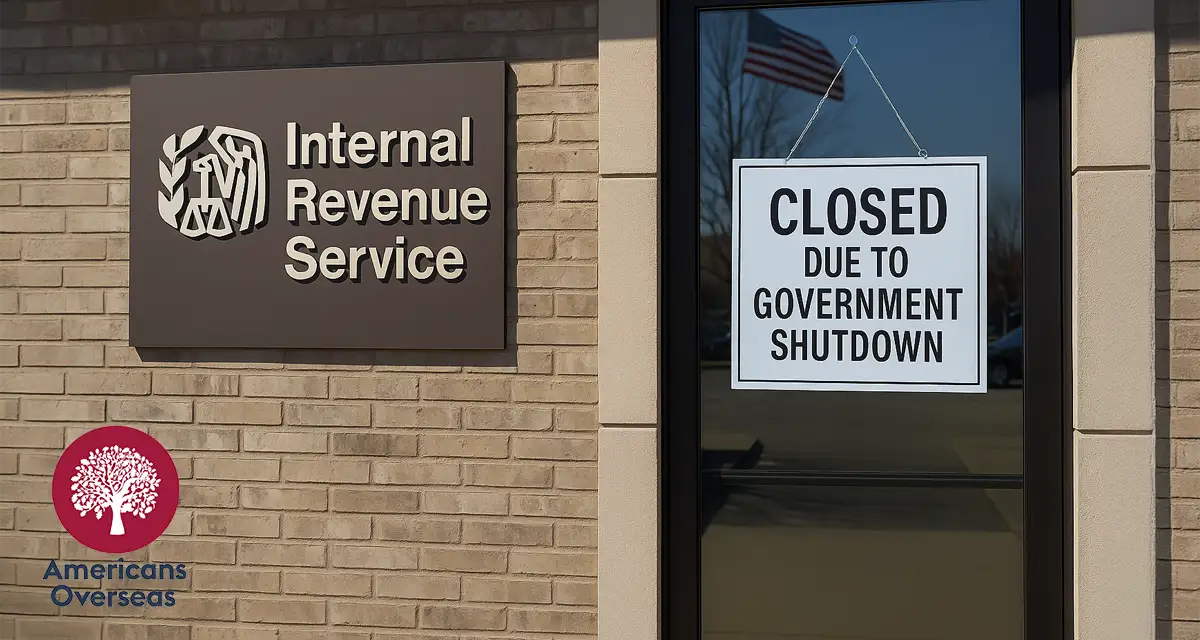
IRS Shutdown 2025: What It Means for Americans Abroad

Since October 8, 2025, large parts of the U.S. government have been shut down due to a budget standoff in Congress. One of the most affected agencies is the IRS (Internal Revenue Service), which is now operating at minimal capacity. For Americans living outside the United States, this creates uncertainty, delays, and added administrative burdens — especially regarding U.S. tax filing obligations.
IRS Closed: Which Services Have Stopped?
Most IRS employees have been placed on unpaid leave. Taxpayer assistance centers are closed, phone lines are inactive, and physical mail is no longer processed. Critical forms that require human review — such as the Foreign Earned Income Exclusion (Form 2555), Foreign Tax Credit (Form 1116), and FATCA-related disclosures (Form 8938) — remain untouched.
ITIN applications, transcript requests, and any mailed corrections will not be processed until the IRS resumes full operations.
Digital Systems Still Operational – With Limits
Despite the shutdown, digital platforms such as e-filing and online payment portals remain active. You can still file your taxes through IRS e-file and pay online.
However, the IRS is now functioning as a digital inbox. You can submit documents, but there is no human response, no confirmation, and no processing of complex or paper-based returns. Tax returns from abroad filed during this time may sit in limbo for weeks or even months.
Higher Risk for Americans Abroad
The IRS shutdown in 2025 poses a greater challenge for Americans abroad than for those living in the U.S. International tax filings tend to be more complex — involving foreign income, foreign bank accounts, FBAR, and FATCA compliance.
Without staff available to review, these filings join a growing backlog. Those waiting on refunds, ITINs, or IRS responses will face extended delays. Communication channels — including the international helpline and Taxpayer Advocate Service — are currently closed.
Filing Deadlines Still Apply
Even though the IRS is closed, U.S. tax deadlines for expats remain in effect. You are still required to file and pay taxes on time.
Automated IRS systems may still generate late-filing notices or penalties. While these can be reversed later, it often requires additional paperwork and patience once the IRS resumes full operations.
What You Should Do Now
Do not delay. File your tax return electronically, pay any outstanding tax liabilities online, and keep copies of everything you submit.
Monitor IRS.gov and the U.S. Department of the Treasury for official updates. News about system restorations or extensions may appear there first.
If you’re unsure what to do or facing delays, work with a tax advisor experienced in expat tax obligations. Americans Overseas can assist — without charge or obligation — and connect you with affordable professionals if needed.
Get informed with Americans Overseas
A government shutdown may be temporary, but the aftermath at the IRS usually lasts much longer. For Americans living abroad, it can mean months of delays, missed refunds, and additional administrative burdens.
That’s why it’s important to stay informed. At Americans Overseas, we’re here to help — with clear advice, explanations, and practical support.
We, the founders of Americans Overseas, were born in the Netherlands and received our American citizenship through our (American) mother.
When we first learned about the U.S.–Netherlands tax treaty around 2013, we felt disbelief (“this can’t be true”), anger (“how can they do this?”), fear (“will I get fined or have problems?”), and panic (“what should I do?”).
Unfortunately, it is true that there is a U.S. tax obligation for Dutch citizens who acquired American nationality by birth. There was no information from local authorities, the U.S. consulate referred us to the IRS, and the IRS itself was impenetrable.
That is why we started this initiative: to help others with reliable information, to prevent unnecessary panic, and to offer free, no‑obligation assistance. When needed, we can connect you with a network of affordable professionals (accountants) who can help you meet your U.S. tax obligations.
Frequently Asked Questions: IRS Shutdown 2025
Understanding the US tax system, the obligations, and all the additional terms can be difficult. Especially if one lives outside of America. Is your question not answered? Contact us.
-
Do I still need to file my U.S. tax return during the shutdown?
Yes. Legal deadlines remain in effect, even though the IRS is not processing returns at this time.
-
Can I still be fined if my return is delayed by the IRS shutdown?
Yes. Automated systems may still issue penalties or notices. These can often be reversed later — but only after the IRS is fully operational again.
-
What happens to my paper-filed return or ITIN application?
Anything sent by mail will not be opened or processed until the IRS reopens.
-
Can I contact the IRS from abroad during the shutdown?
No. The international helpline and most IRS departments are closed. Emails and phone calls are not being answered.
-
How do I know when my return or request will be processed?
You don’t. The backlog will be addressed only after IRS staff return to work. Updates will be posted on IRS.gov.
Read more
View all newsAm I a US Person for tax purposes?
Find out in 2 minutes whether the IRS considers you a “US Person” and whether you may be required to file a US tax return — even if you live outside the United States.







